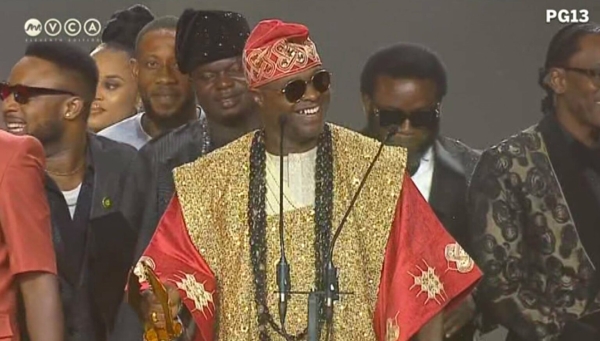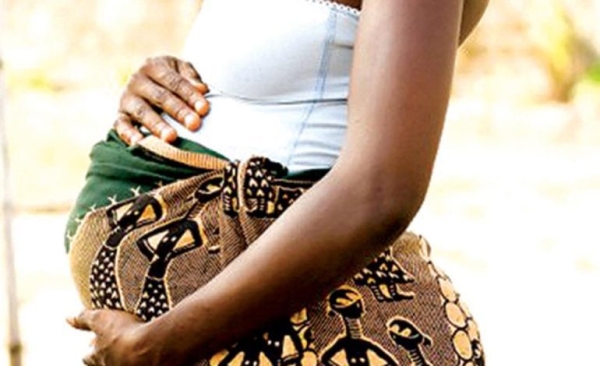TOP NEWS
Reuben's View
Latest News
Search
MOST READ
-
Dangote Reappointed Chancellor, Donates N15billion University
-
Obidients Carpet Akpabio For Attacking Obi
-
Yobe Ambush: 2 Soldiers Under Probe For ‘Working With Terrorists’, Sabotage
-
FULL LIST: Femi Adebayo’s Seven Doors scores big at #AMVCA11, wins best lead actor, actress
-
‘I Hold Tinubu In Utmost Respect’ – Natasha Speaks On Viral Video With ‘Omo Ologo’ Song Amid Rumours Of Defection
-
Liverpool host Arsenal in EPL showdown as Barca, Madrid clash in La Liga
-
N1.2bn Sterling Bank Theft: Court Orders Forfeiture After System Glitch
-
Rockefeller Foundation To Unlock $110bn Investment In Developing Countries
-
78 Nigerians rescued from human traffickers in Côte d’Ivoire return home
-
Full List: Six states with highest case of malpractice in 2025 UTME
-
Seun Kuti escapes death in America
977 times -
Nigeria emerge capital of malnourished children in Africa, second globally - UNICEF
525 times -
Natasha: Akpabio Withdraws From Presidential Panel Over Sexual Harassment Allegations
508 times -
Nigeria To Provide Electricity For 300 million Africans - Says Abbas
441 times -
Why helicopter carrying Wigwe, wife, son, three others crashed – US NTSB
437 times -
Kano State Govt Directs All LGs To Contribute ₦670 Million For Emir Sanusi’s Vehicles
421 times -
Northern Governor Opens Up On Plot To Dump PDP For APC
386 times -
Presidency Reacts As Nigeria Repays All Debts To IMF
376 times -
Drama as 18-year-old apprentice impregnates 10 girls, including boss’ daughter in five months
360 times -
I Will Still Support Obi In 2027 – Farotimi
356 times








![[OPINION] Pope Trump, Adebanjo And Other Stories - Reuben Abati [OPINION] Pope Trump, Adebanjo And Other Stories - Reuben Abati](https://www.reubenabati.com.ng/cache/mod_bt_contentslider/a9c28326249471b0c6d135375d9aa6d3-66656381f38ceca0faf1a84f4c1885dd_XL.jpg)
![[OPINION] CBEX Wealth Chasers, NDIC And The Fate Of Depositors - Reuben Abati [OPINION] CBEX Wealth Chasers, NDIC And The Fate Of Depositors - Reuben Abati](https://www.reubenabati.com.ng/cache/mod_bt_contentslider/e7c29125e793371f688b9def0c150948-867aa1263f279020e1b930969b024a70_XL.jpg)
![[OPINION] Pope Francis (1936 – 2025) - Reuben Abati [OPINION] Pope Francis (1936 – 2025) - Reuben Abati](https://www.reubenabati.com.ng/cache/mod_bt_contentslider/9df20a858100040a45e2fc6915d65f41-c0395aa98d8919afead20f020215aa2b_XL.jpg)
![[OPINION] Plateau, Tsiga and Trump - Reuben Abati [OPINION] Plateau, Tsiga and Trump - Reuben Abati](https://www.reubenabati.com.ng/cache/mod_bt_contentslider/d4ff657a4976c08f133a5993db7ca3de-076f7f795e47e1dc74a28ca93d3c698e_XL.jpg)
![[OPINION] The Uromi 16 And The Problem With Nigeria - Reuben Abati [OPINION] The Uromi 16 And The Problem With Nigeria - Reuben Abati](https://www.reubenabati.com.ng/cache/mod_bt_contentslider/848d0c6943c9a9cb7639e8f5640d2cbf-4b585f7414a3fc875b761851d4c5fcd4_XL.jpg)
![[OPINION] Breakfast With The Soludos - Reuben Abati [OPINION] Breakfast With The Soludos - Reuben Abati](https://www.reubenabati.com.ng/cache/mod_bt_contentslider/a98b5c30f61dcb10378fdba9f5e472ab-33b747862875f50d863e709f5955da5d_XL.jpg)
![[OPINION] The Emerging Coalition Against Tinubu/APC - Reuben Abati [OPINION] The Emerging Coalition Against Tinubu/APC - Reuben Abati](https://www.reubenabati.com.ng/cache/mod_bt_contentslider/ddd6416fbaa008a5bcbc568f0e3c8857-02972c9f0dee40a6ad85830afbb49758_XL.jpg)
![[OPINION] Nasir El-Rufai’s Defections: PDP, CPC, APC, SDP - Reuben Abati [OPINION] Nasir El-Rufai’s Defections: PDP, CPC, APC, SDP - Reuben Abati](https://www.reubenabati.com.ng/cache/mod_bt_contentslider/817d1e0c4d951b18f15f406968204870-61d46cc1859ac5d4f70406214a7d7e4f_XL.jpg)
![[OPINION] A World Of Godfathers - Reuben Abati [OPINION] A World Of Godfathers - Reuben Abati](https://www.reubenabati.com.ng/cache/mod_bt_contentslider/f282a08e8e116be2577cc430882505bc-6d66582218d28730d47a7b9a32e18004_XL.jpg)
![[OPINION] Babangida’s Book - Reuben Abati [OPINION] Babangida’s Book - Reuben Abati](https://www.reubenabati.com.ng/cache/mod_bt_contentslider/c8905774fa75570e79f747809f6c142f-4452414e756ce827f8bc4b72b9376062_XL.jpg)
![[OPINION] Ayo Adebanjo and Alaperu Basibo: In Requiem - Reuben Abati [OPINION] Ayo Adebanjo and Alaperu Basibo: In Requiem - Reuben Abati](https://www.reubenabati.com.ng/cache/mod_bt_contentslider/32644a58ca6a6a9730d34e04e0b971d4-29f647f2f922ae7f6d08ba2b3025e7df_XL.jpg)
![[OPINION].The Coming Food Revolution In Lagos - Reuben Abati [OPINION].The Coming Food Revolution In Lagos - Reuben Abati](https://www.reubenabati.com.ng/cache/mod_bt_contentslider/a460cd374cf73b084bed0ea4a95f3470-f0e6dbf155e463f366df4402ca7102d3_XL.jpg)



![[OPINION] As The World Welcomes A New Pontiff - Sheddy Ozoene](https://www.reubenabati.com.ng/media/k2/items/cache/8cfd771972c587def3f459df489311be_XL.jpg?t=-62169984000)




![[OPINION] Kenya Do Nigeria Right Hand: Trapped in Cycles of Chaos - Prince Charles Dickson](https://www.reubenabati.com.ng/media/k2/items/cache/ff760ebe8e50b2b8e5dcbf718861bec2_XL.jpg?t=-62169984000)
![[OPINION] 2025 JAMB: Results That Exposed Our Values - Richard Odusanya](https://www.reubenabati.com.ng/media/k2/items/cache/2a5e32a0134596a7d1b7b948f4481480_XL.jpg?t=-62169984000)
![[OPINION] Wike, Nigerians Don’t Cook Or Spend Infrastructure, Let the People Speak! - Isaac Asabor](https://www.reubenabati.com.ng/media/k2/items/cache/ea3491113efa0db3b2e939619653fab4_XL.jpg?t=-62169984000)







![[OPINION] Nigeria: The making of a judicial selectorate - Chidi Anselm Odinkalu](https://www.reubenabati.com.ng/media/k2/items/cache/ed744cbe7f3f4f7009585254df3e4cfc_XL.jpg?t=-62169984000)


![[OPINION] Why not solar panels at Aso Rock? - Dele Sobowale](https://www.reubenabati.com.ng/media/k2/items/cache/eb2d3f728de96efcfa06b7f7cd1d5937_XL.jpg?t=-62169984000)

![[OPINION] Nigeria’s judiciary appears set to rescue itself - Tonnie Iredia](https://www.reubenabati.com.ng/media/k2/items/cache/e357ad63eaeb29672bb337ee1cf0258c_XL.jpg?t=-62169984000)




![[OPINION] Baba Fasoranti at 99 - Festus Adedayo](https://www.reubenabati.com.ng/media/k2/items/cache/9a9a20599433f9b8f981886027a6bc4a_XL.jpg?t=-62169984000)

![[OPINION] Aso Rock, voodoo statistics and my friend, Al Venter - Festus Adedayo](https://www.reubenabati.com.ng/media/k2/items/cache/d7dd04249df370935deb82ced6257c3f_XL.jpg?t=-62169984000)
![[OPINION] Much ado about Utomi’s shadow government - Bolanle Bolawole](https://www.reubenabati.com.ng/media/k2/items/cache/a63ef400f7104893bb7e28490ad020f3_XL.jpg?t=-62169984000)


![[OPINION] Descent Into Anomie - Wole Olaoye](https://www.reubenabati.com.ng/media/k2/items/cache/7b01d61661e023a8e351a9609dbaf7d3_XL.jpg?t=-62169984000)


![[OPINION] 2027: Rehearsing an Unlikely Coronation - Chidi Amuta](https://www.reubenabati.com.ng/media/k2/items/cache/118339726edb4ab5a694269d3cfe2d39_XL.jpg?t=-62169984000)
![[OPINION] Between Marketing and Demarketing Nigeria - Simon Kolawole](https://www.reubenabati.com.ng/media/k2/items/cache/e2dbd7a6961f55635460c9d99a6e5beb_XL.jpg?t=-62169984000)



![[OPINION] As The World Welcomes A New Pontiff - Sheddy Ozoene [OPINION] As The World Welcomes A New Pontiff - Sheddy Ozoene](https://www.reubenabati.com.ng/cache/mod_bt_contentslider/bf588330d8d12ed9e7ef25c11b37a8d8-8cfd771972c587def3f459df489311be_XL.jpg)




![[OPINION] Kenya Do Nigeria Right Hand: Trapped in Cycles of Chaos - Prince Charles Dickson [OPINION] Kenya Do Nigeria Right Hand: Trapped in Cycles of Chaos - Prince Charles Dickson](https://www.reubenabati.com.ng/cache/mod_bt_contentslider/7f76fae0a27608225d87866aef1bc6bd-ff760ebe8e50b2b8e5dcbf718861bec2_XL.jpg)
![[OPINION] 2025 JAMB: Results That Exposed Our Values - Richard Odusanya [OPINION] 2025 JAMB: Results That Exposed Our Values - Richard Odusanya](https://www.reubenabati.com.ng/cache/mod_bt_contentslider/ae828dfef10e685cf789565f58842beb-2a5e32a0134596a7d1b7b948f4481480_XL.jpg)
![[OPINION] Wike, Nigerians Don’t Cook Or Spend Infrastructure, Let the People Speak! - Isaac Asabor [OPINION] Wike, Nigerians Don’t Cook Or Spend Infrastructure, Let the People Speak! - Isaac Asabor](https://www.reubenabati.com.ng/cache/mod_bt_contentslider/f636f7f9f61a93db3cc3f8b7f0de116e-ea3491113efa0db3b2e939619653fab4_XL.jpg)







![[OPINION] Nigeria: The making of a judicial selectorate - Chidi Anselm Odinkalu [OPINION] Nigeria: The making of a judicial selectorate - Chidi Anselm Odinkalu](https://www.reubenabati.com.ng/cache/mod_bt_contentslider/443c933f3803275e10e86c224291d2e3-ed744cbe7f3f4f7009585254df3e4cfc_XL.jpg)


![[OPINION] Why not solar panels at Aso Rock? - Dele Sobowale [OPINION] Why not solar panels at Aso Rock? - Dele Sobowale](https://www.reubenabati.com.ng/cache/mod_bt_contentslider/dcde24d6d82648c8cf654ffa8007e784-eb2d3f728de96efcfa06b7f7cd1d5937_XL.jpg)

![[OPINION] Nigeria’s judiciary appears set to rescue itself - Tonnie Iredia [OPINION] Nigeria’s judiciary appears set to rescue itself - Tonnie Iredia](https://www.reubenabati.com.ng/cache/mod_bt_contentslider/a818be69239f29da320218d2445a5153-e357ad63eaeb29672bb337ee1cf0258c_XL.jpg)




![[OPINION] Baba Fasoranti at 99 - Festus Adedayo [OPINION] Baba Fasoranti at 99 - Festus Adedayo](https://www.reubenabati.com.ng/cache/mod_bt_contentslider/1682a979975598f178794633458f8f2e-9a9a20599433f9b8f981886027a6bc4a_XL.jpg)

![[OPINION] Aso Rock, voodoo statistics and my friend, Al Venter - Festus Adedayo [OPINION] Aso Rock, voodoo statistics and my friend, Al Venter - Festus Adedayo](https://www.reubenabati.com.ng/cache/mod_bt_contentslider/825c2188ce2a277530f1e4a86f5255c1-d7dd04249df370935deb82ced6257c3f_XL.jpg)
![[OPINION] Much ado about Utomi’s shadow government - Bolanle Bolawole [OPINION] Much ado about Utomi’s shadow government - Bolanle Bolawole](https://www.reubenabati.com.ng/cache/mod_bt_contentslider/0971e7b31a50cfdb619cf291bcb483d3-a63ef400f7104893bb7e28490ad020f3_XL.jpg)


![[OPINION] Descent Into Anomie - Wole Olaoye [OPINION] Descent Into Anomie - Wole Olaoye](https://www.reubenabati.com.ng/cache/mod_bt_contentslider/64344672dd0c6d28bd2ded3fe15fa563-7b01d61661e023a8e351a9609dbaf7d3_XL.jpg)


![[OPINION] 2027: Rehearsing an Unlikely Coronation - Chidi Amuta [OPINION] 2027: Rehearsing an Unlikely Coronation - Chidi Amuta](https://www.reubenabati.com.ng/cache/mod_bt_contentslider/eaf4f499690cbfc5397a89a0ae17fe2f-118339726edb4ab5a694269d3cfe2d39_XL.jpg)
![[OPINION] Between Marketing and Demarketing Nigeria - Simon Kolawole [OPINION] Between Marketing and Demarketing Nigeria - Simon Kolawole](https://www.reubenabati.com.ng/cache/mod_bt_contentslider/ea28fac2c678ca8826210151efce2c20-e2dbd7a6961f55635460c9d99a6e5beb_XL.jpg)













![[OPINION] Women are free to be gold diggers - Funke Egbemode [OPINION] Women are free to be gold diggers - Funke Egbemode](https://www.reubenabati.com.ng/cache/mod_bt_contentslider/b9ec59319b1d0648523cf281b68743dc-97e85f0f2d6151233809aeeb6795df34_XL.jpg)
![[OPINION] Papa T, Baby T and the Jagabans - Adamu Rabiu [OPINION] Papa T, Baby T and the Jagabans - Adamu Rabiu](https://www.reubenabati.com.ng/cache/mod_bt_contentslider/22bcb2da5a6c7f7216bcdd919f64a71b-fda8b9e47e4f0910c03b0f89f97d784a_XL.jpg)
![[OPINION] ‘Prepare for war on truth’ - Martins Oloja [OPINION] ‘Prepare for war on truth’ - Martins Oloja](https://www.reubenabati.com.ng/cache/mod_bt_contentslider/2802a12b2989a7c884c10262805af0f7-7e9f301f44bbf328f35acde1fa64ef16_XL.jpg)








![[OPINION] Is Gov Soludo envious of Peter Obi? - Ugoji Egbujo [OPINION] Is Gov Soludo envious of Peter Obi? - Ugoji Egbujo](https://www.reubenabati.com.ng/cache/mod_bt_contentslider/bf15d5ae69686681b745b921e4a7c884-d1eab447f6547a16a6872794220ea691_XL.jpg)
![[OPINION] Inadvisability Of “Escalading ”Amidst Escalating Hardships - Isaac Asabor [OPINION] Inadvisability Of “Escalading ”Amidst Escalating Hardships - Isaac Asabor](https://www.reubenabati.com.ng/cache/mod_bt_contentslider/711916f37913f410a5fbbb54711d5352-3d9ddc1918e2f3762d8fb89cb2db9ab6_XL.jpg)
![[OPINION] The Unified Absurdity: How Backward Thinking in Education, Healthcare, and Professional Recognition is Stifling Nigeria’s Progress - John Egbeazien Oshodi [OPINION] The Unified Absurdity: How Backward Thinking in Education, Healthcare, and Professional Recognition is Stifling Nigeria’s Progress - John Egbeazien Oshodi](https://www.reubenabati.com.ng/cache/mod_bt_contentslider/beaa40635d370bbf639784ebd53fa3e2-2bfebbba065dfda10a222000efe8b5ad_XL.jpg)
![[OPINION] Reclaiming the Narrative: Adesina, truth and defence of accountability - Umar Sani [OPINION] Reclaiming the Narrative: Adesina, truth and defence of accountability - Umar Sani](https://www.reubenabati.com.ng/cache/mod_bt_contentslider/93692ac1a072071b9657b555f71efce5-1b1a82d830c2574eb1206f043015f637_XL.jpg)
![[OPINION] The battle of coalitions - Jonathan Nda-Isaiah [OPINION] The battle of coalitions - Jonathan Nda-Isaiah](https://www.reubenabati.com.ng/cache/mod_bt_contentslider/314b295a350a0a77324abd4374fe5142-e49f085668e36b4b1ba1891966f04139_XL.jpg)
![[OPINION] Pressing need for unity among Yoruba royal fathers - Temidayo Akinsuyi [OPINION] Pressing need for unity among Yoruba royal fathers - Temidayo Akinsuyi](https://www.reubenabati.com.ng/cache/mod_bt_contentslider/eafe2a5fd8c294fbcd798fc008ee9e10-3f15fa3ee13e58e7541d43078a4ecf47_XL.jpg)
![[OPINION] The New Pope is “Black,” Now What? - Farooq A. Kperogi [OPINION] The New Pope is “Black,” Now What? - Farooq A. Kperogi](https://www.reubenabati.com.ng/cache/mod_bt_contentslider/4170cd50ed6b2e5609b8b6c719741f04-c8210cc74a939627ad828faf06f3754d_XL.jpg)
![[OPINION] FUOYE VC’s Ridiculous Libel Lawsuit Over Sexual Harassment - Farooq A. Kperogi [OPINION] FUOYE VC’s Ridiculous Libel Lawsuit Over Sexual Harassment - Farooq A. Kperogi](https://www.reubenabati.com.ng/cache/mod_bt_contentslider/f4979fe7491560e008602e4beb7a92e2-e4760ee2df843881ccd2f7a95af9b0a1_XL.jpg)
![[OPINION] Nigeria First Policy: Beyond the Mantra - Obinna Chima [OPINION] Nigeria First Policy: Beyond the Mantra - Obinna Chima](https://www.reubenabati.com.ng/cache/mod_bt_contentslider/bae97817c7cdf8474430bae95292f0b4-2bf91fd31c52ad6b7b598aba3015fb01_XL.jpg)
![[OPINION] Concerning the Opposition - Okey Ikechukwu [OPINION] Concerning the Opposition - Okey Ikechukwu](https://www.reubenabati.com.ng/cache/mod_bt_contentslider/af72876d9c41e74f6a69297bc2205976-5b3a66e684df7f74dbdb4fc87b86560a_XL.jpg)
![[OPINION] The Pope’s Election: Not for Roman Catholics - Valentine Obienyem [OPINION] The Pope’s Election: Not for Roman Catholics - Valentine Obienyem](https://www.reubenabati.com.ng/cache/mod_bt_contentslider/555f2c21283a5a7adcf13698f22451b6-646567cc734c623662193ff65cc4d0a8_XL.jpg)
































![[OPINION] ECOWAS at a Crossroads - Adekeye Adebajo [OPINION] ECOWAS at a Crossroads - Adekeye Adebajo](https://www.reubenabati.com.ng/cache/mod_bt_contentslider/afa77ae6568aae416095a8da423fa996-767d86541b4f8e975d8c50b746c24e66_XL.jpg)








![[OPINION] President Tinubu: Anambra Visit and the Petals of Inclusive Leadership - Fredrick Nwabufo [OPINION] President Tinubu: Anambra Visit and the Petals of Inclusive Leadership - Fredrick Nwabufo](https://www.reubenabati.com.ng/cache/mod_bt_contentslider/9480d651b0010639572b0cd18eb55c53-b1964d3d7bf3bdf51285dfc74cbf2d39_XL.jpg)























